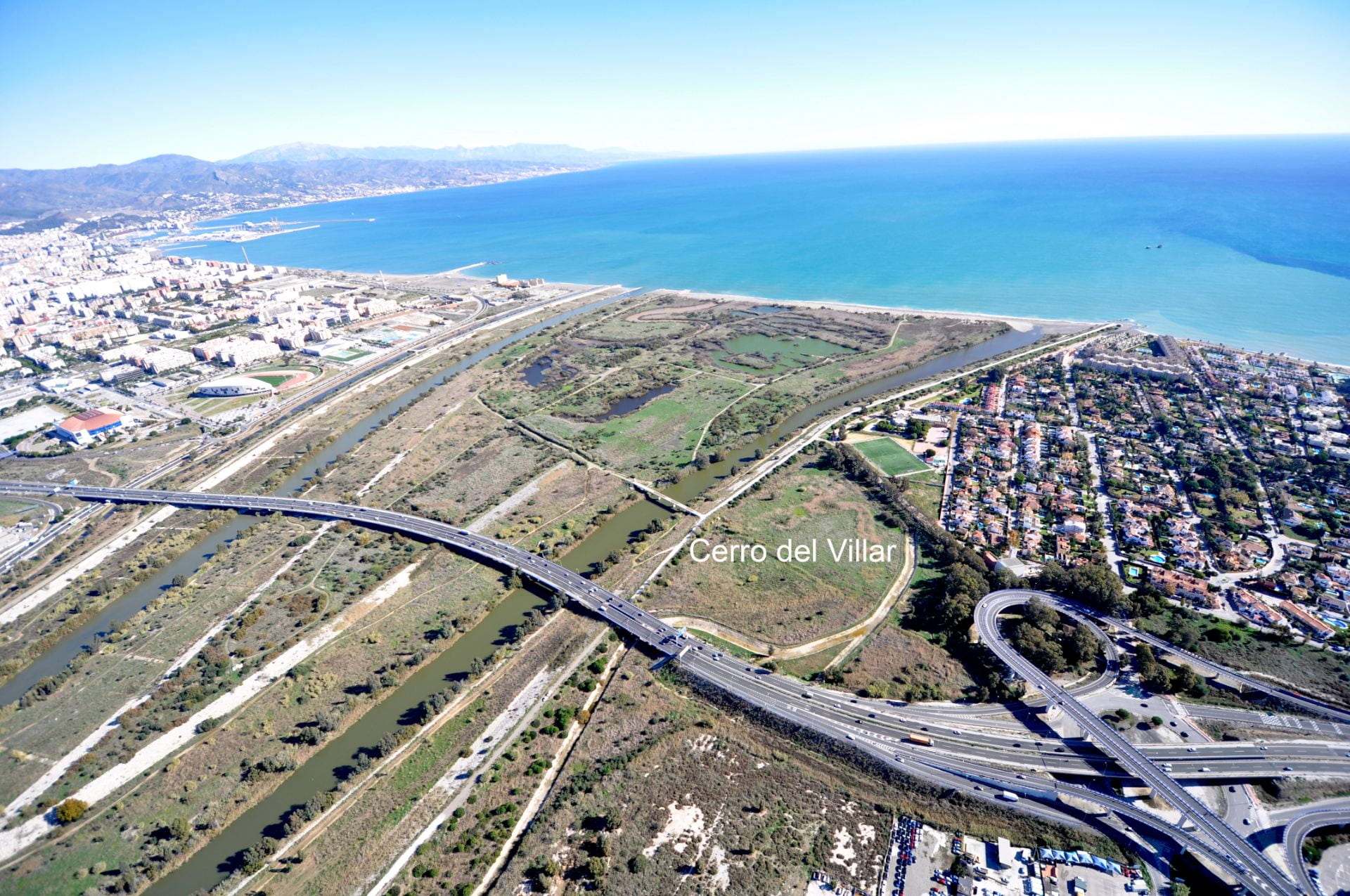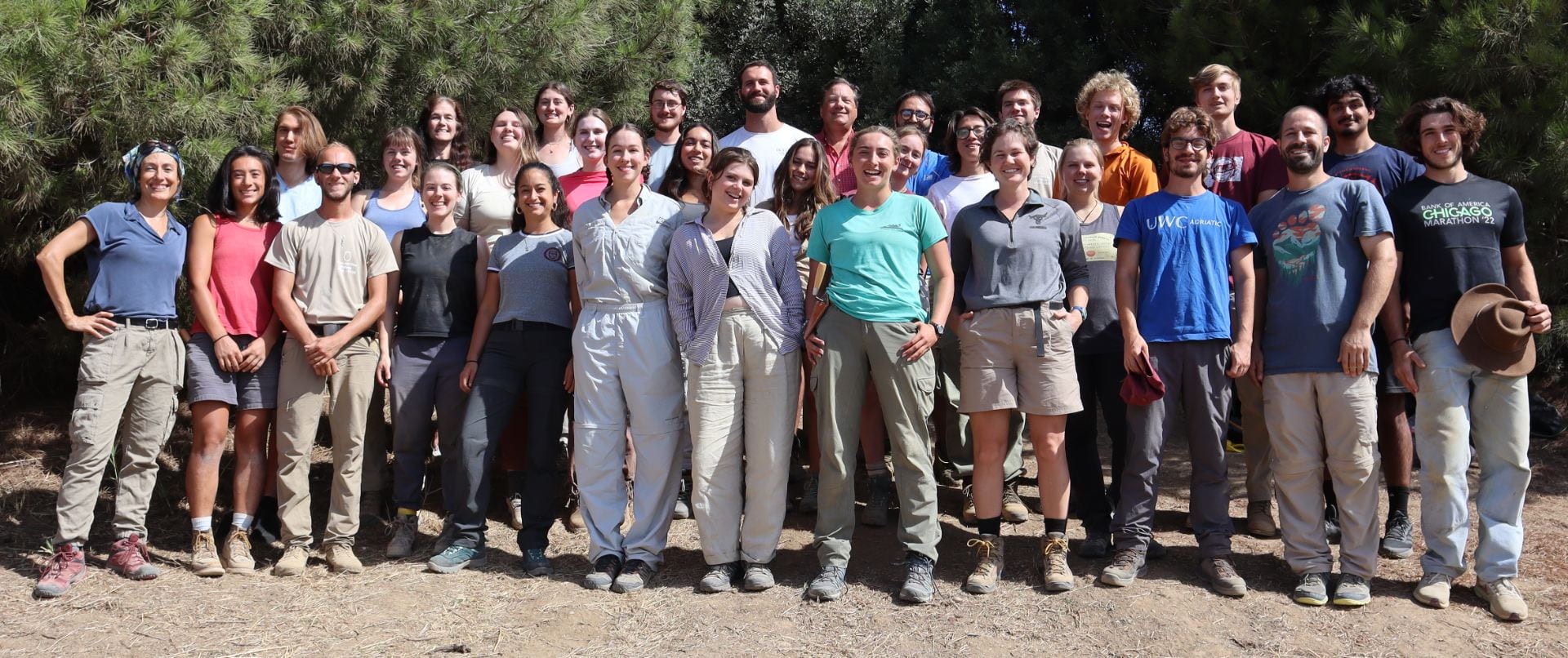The Archaeological Excavations at Cerro del Villar in Spain
The University of Chicago is cooperating with Spanish archaeologists to excavate the Iron Age Phoenician colony of Cerro del Villar on the outskirts of the city of Málaga on the south coast of Spain. This eight-hectare (20-acre) archaeological site lies beside the Guadalhorce River, one kilometer from the Mediterranean shore. In ancient times it was an island in the wide mouth of the river, which has since silted up and has been canalized into two parallel water courses, as shown in the photograph below.
Cerro del Villar was previously excavated by María Eugenia Aubet of the Pompeu Fabra University of Barcelona, a leading figure in the archaeology of the Phoenicians in Spain and author of the seminal book The Phoenicians and the West: Politics, Colonies, and Trade (2d ed.; Cambridge, 2001). Prof. Aubet found evidence that the site was settled by Phoenicians from the Levant no later than the eighth century BCE and was abandoned by them in the sixth century BCE, with no later town built on top of the Phoenician buildings.
Most Iron Age Phoenician towns are buried under modern cities and are largely inaccessible, thus Cerro del Villar provides a rare opportunity to obtain an extensive exposure of the urban layout and to investigate the causes and consequences of the exploration and colonization of the Iberian peninsula three millennia ago by people from the other end of the Mediterranean, 2,000 kilometers away. Long before the Greeks and Romans, these people — descendants of the Bronze Age Canaanites who lived on the coast of what is today Lebanon and northern Israel and were called “Phoenicians” by the Greeks — established a pan-Mediterranean network of trade and communication that affected the entire course of ancient history. They brought with them the urban culture of the Near East and the alphabetic writing system and religious beliefs, practices, and stories of the ancient Levant.

The overall head of the current research at Cerro del Villar is José Suárez Padilla, an archaeologist at the University of Málaga, who had previously excavated this site with María Eugenia Aubet. In addition to the excavations conducted by the University of Málaga team and the University of Chicago team, geophysical and geomorphological studies of the site are being conducted by Aachen University under the direction of Prof. Klaus Reicherter.
The University of Chicago excavation team is co-directed by David Schloen, Professor of Archaeology in the Institute for the Study of Ancient Cultures and Department of Near Eastern Languages and Civilizations, and Carolina López-Ruiz, Professor of Ancient Mediterranean Religions and Mythologies in the Divinity School and Department of Classics, who is an expert on Phoenician religion and history and the author of Phoenicians and the Making of the Mediterranean (Harvard, 2022). The University of Málaga excavation team is co-directed by José Suárez Padilla and Manuel Álvarez Martí-Aguilar, a professor of ancient history with expertise on the Phoenician period in Spain.
The two teams are working closely together to explore different sectors of the archaeological site. After two successful seasons of excavation in 2022 and 2023, we plan to return to Cerro del Villar in 2024 to continue the work.
APPLY TO JOIN THE EXCAVATION TEAM IN 2024
The next excavations at Cerro del Villar will take place from Sunday, August 25, to Saturday, September 21, 2024. We are now taking applications from students and volunteer diggers to join our team — no prior archaeological experience is required. If you are interested in participating, please send your curriculum vitae (résumé) via email to Prof. David Schloen at dschloen@uchicago.edu as soon as possible and no later than March 29, 2024. We may accept applications after that, if we still have space available, but you should apply by March 29 to maximize your chance of being accepted.
The participation fee is $4,000 USD (reduced to $3,000 for University of Chicago students). This includes:
- Hotel accommodation for four weeks (27 nights) in the Holiday Inn Express near the Málaga airport (two persons per room).
- All meals (breakfast and dinner in the hotel and lunch at a nearby restaurant).
- Three weekend day trips to visit sites of interest in the beautiful region of Andalucía.
If your application is accepted, you will book and pay for your own travel to Málaga and submit your participation fee via check or money order to Prof. Schloen in person or by mail to the following address:
David Schloen, Institute for the Study of Ancient Cultures, University of Chicago, 1155 East 58th Street, Chicago, IL 60637 U.S.A.
For University of Chicago students: Prof. Schloen can suggest sources of travel funding to which you may apply to subsidize the cost of your airfare and accommodations.
EARN ACADEMIC COURSE CREDIT
The dig at Cerro del Villar is an archaeological field school in which participants learn methods of stratigraphic excavation and recording while working at the site five days per week for four weeks. Participants may enroll in a practice-based “Field Archaeology” course concurrent with the excavation to earn academic course credit from the University of Chicago, although this is not required in order to join the excavation team and the tuition fee is extra. Information about this course may be found on the website of the University of Chicago Summer Session under the course code NEAA 20091.

The University of Chicago excavation team at Cerro del Villar in September 2023
INFORMATION ABOUT THE 2024 EXCAVATIONS: ACCOMMODATIONS AND WORK SCHEDULE
Participants in the Cerro del Villar 2024 excavations of the University of Chicago will check into the Holiday Inn Express near the Málaga airport on Sunday, August 25, and will check out on Saturday, September 21. Students and other volunteer diggers will work closely with the archaeological staff, who will give them hands-on training in stratigraphic excavation methods and computerized field recording procedures, including digital mapping of architectural features and artifact find-spots.
We will work on the site for five days per week, from Monday to Friday, with an initial orientation and training session on the first Monday, August 26. We will excavate from 8:00 a.m. until 2:45 p.m. and then have lunch in a restaurant nearby, after which we will return to the hotel for a rest period followed by either a lab session from 6:30 to 8:00 p.m. (to wash and sort the pottery and other finds) or a lecture from 7:00 to 8:00 p.m.
Evening lectures by the excavation co-directors and other archaeological staff will provide background information on the Canaanite and Phoenician cultures of the Bronze and Iron Age Levant (ca. 3000 to 600 BCE) and will introduce students to the latest discoveries concerning the Phoenician colonization of the Iberian peninsula and western Mediterranean and the indigenous cultures encountered there by the migrants from the Levant.
The daily schedule from Monday to Friday each week is as follows:
- Breakfast in the hotel at 7:00 a.m.
- Bus departs for the site at 7:45 a.m.
- Excavation from 8:00 a.m. until 2:45 p.m.
- Snack on site from 11:00 to 11:30 a.m. (fruit, bread, cheese, cold cuts)
- Bus to a nearby restaurant for lunch at 3:00 p.m.
- Walking back to the hotel at 4:00 p.m. (700 meters from the restaurant)
- Free time until 6:30 p.m.
- Lab session from 6:30 to 8:00 p.m. (washing and sorting the finds, etc.) OR a lecture from 7:00 to 8:00 p.m.
- Dinner in the hotel at 8:30 p.m.
There will be a day trip via bus on each Saturday (August 31, September 7, September 14) to visit sites and museums of interest in the surrounding region. Sundays are free time to travel to other cities in Andalucía, visit the old city of Málaga, hang out at the beach, or just relax in the hotel.
There is a laundromat across the highway from the hotel for washing clothes. There are frequent buses from the hotel to the center of Málaga. The beach is within walking distance of the hotel, about two kilometers away.
